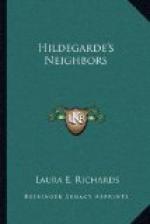“Are you too old for dolls, Hildegarde?” asked the Colonel, puffing with pleasure as he saw the delight in the girl’s face. “These are birthday fairies, you observe. There are eighteen of them, and every one of them wishes you good luck, my dear, and every happiness, every blessing that Heaven can bestow.”
The good Colonel had begun merrily enough, but before the end of his little speech his deep voice trembled, and the tears stood in Hildegarde’s eyes. She tried to speak, but the words did not come; so, leaving her seat, she went quietly up to the Colonel and kissed his forehead. “Thank you, dear friend!” she said; and it was all she could say.
“There! there!” said the Colonel, recovering himself at once. “Glad you like it, my child! Glad you like it! The fancy was my mother’s; she had a poetic taste, madam.” He turned to Mrs. Merryweather, who was beaming with admiration and delight. “She had these little figures made long ago,—for another eighteenth birthday,—a dear young friend of hers. Yes, yes! They have been kept in cotton-wool forty years, madam. Little candle holders, you perceive. A pretty fancy, eh? I happened to remember them the other day,—hunted ’em up,—the result, thanks to Mrs. Grahame and Elizabeth Beadle. Mrs. Beadle, ma’am, I desire that you will come in, and not skulk in the doorway there, as if you had reason to be ashamed of your handiwork. My housekeeper, Mrs. Beadle, ladies and gentlemen: a good woman, if she will allow me to say so, and a good cook. Now, Guiseppe, a knife for Miss Grahame, and we will test the quality of this same cake. Plenty of citron, I trust, Elizabeth Beadle? No little skimpy bits, but wedges, slabs of citron? Ha! that is as it should be. She wanted to make a white cake, my dear,—a light, effervescent kind of thing, that can hardly be tasted in the mouth; but I refused to insult either you or my traditions in such a manner. A birthday cake, Mrs. Grahame, my dear madam, should be as rich as spices and plums, brandy and citron,—especially citron, which I take to be an epitome of the Orient, gastronomically speaking,—as rich as all manner of good things can make it. You agree with me, my young friend?” He nodded to Gerald, whose eyes met his, flaming with approval.
“Oh, don’t I, sir!” cried Gerald. “When they talk about wholesomeness and that sort of r—of thing,—well, I beg your pardon, mater dear, but you know you do, sometimes, in a manner to turn gray the hair,—when they do, I always think it’s a dreadful shame to have wholesome things on your birthday. And—oh, I say!” Here he relapsed into silence, as the first slice dropped from the side of the great cake, revealing depth upon depth of richness. The two mothers shuddered slightly, and exchanged deploring smiles; but Hugh clasped his hands in rapture, and lifted up his voice and spoke.
“You are King Solomon to-day, Guardian, aren’t you,—instead of other kings, as sometimes you are? And my great-aunt is the Queen of Sheba. And—’there came no more such abundance of spices as these which the Queen of Sheba gave to King Solomon. And gold, and precious stones, and knops and flowers’—oh, see them all! And, Guardian,—I mean King Solomon, do you think there might be an almug tree in the garden?”




